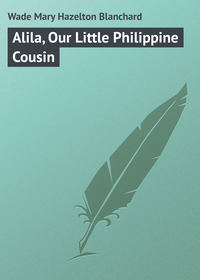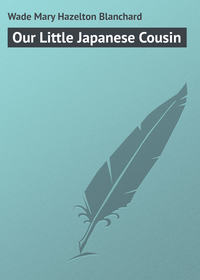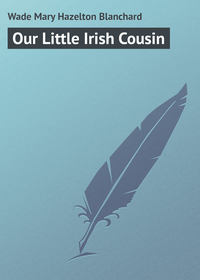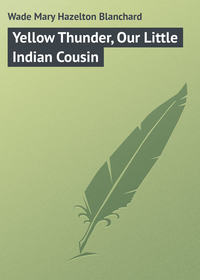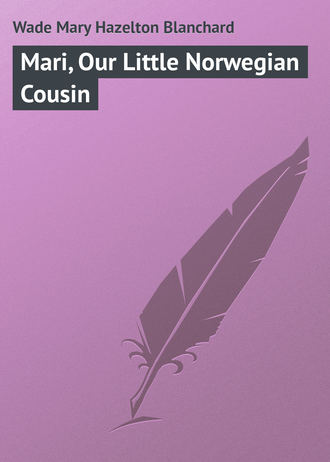 полная версия
полная версияMari, Our Little Norwegian Cousin
Every one in the place was busy now, getting ready for the christening. At last came the great day, as bright and sunny a one as could be wished.
All the work on the farm was stopped and every one in the family was dressed in his best. Mari had a fresh white linen kerchief tied under her chin, and also a finely starched apron. Her plump little arms were bare. Her stomacher was worked with bright beads on scarlet cloth. She had embroidered it all herself and she could not help being proud of it.
But perhaps you do not know what a stomacher is. It is a piece of cloth worn as an ornament on the waist and over the stomach. Mari's mother wore one also, but hers was sparkling with silver trimmings that had belonged to her great-grandmother.
How fine the father looked in his short coat and knee-breeches. He wore a bright red vest, over which hung his long light beard.
But Mari's mother was the prettiest sight of all. Her muslin apron was trimmed with three rows of lovely open-work. Her scarlet waist was finished with bands of black velvet, with the beautiful stomacher in front of that. She had loose white linen sleeves, and such an odd cap. You never saw one like it, I am sure. It was made of crimped white muslin with a wide rim over the forehead, with a narrow band beneath that hid her hair. The corners fell down behind nearly to the waist.
Her silver ornaments must also be mentioned. They were really beautiful, and were hundreds of years old.
Ole looked fine, too, in a suit much like his father's and a little round cap, fitting tightly to his head. You would scarcely have known the family in their holiday dress.
They stepped off gaily, and soon reached the village. They arrived at the church just as the christening party reached it.
"Do look at the dear baby, Ole," said Mari. "Isn't he lovely?"
The nurse was carrying him. He was so swaddled in his fine clothes that you would have almost thought he was an Indian pappoose. Only his face could be seen. The swaddling bands were of many colours, – red, green, and white, and there was a large white satin bow, of course. Every Norse baby wears such a bow to its christening.
And now the flock of people followed the minister into the little church. They passed up to the front and gathered around the altar.
"The baby behaves finely, doesn't he?" whispered Ole. "I am real proud of him because he is to have the same name as myself. Did you hear the minister say Ole, Mari?"
"Yes, but look now. The baby's father and mother and his godparents are all going up behind the altar. What is that for?"
"They are laying presents there for the minister. Of course they want to thank him for the christening. I declare, Mari, our baby was christened only last year, and you have forgotten what people do at such times."
"I was so excited then, Ole, I don't believe I noticed it. But come, everybody is going out of the church. Now we shall have the best time, for you know we are invited to the party."
The building was soon empty, and all the people started gaily for the home of the new baby. The minister went with them, of course. He looked very dignified in his long black gown, with a great white ruff about his neck. He loved his people, and took part in all their merry-makings. Ole and Mari were very fond of him. They ran to his side as soon as they got outdoors. Ole took one hand and Mari the other.
It was only a few steps to the little home of the fisherman. Everything had been made ready for the company. The table was spread with the good things that the Norse people love best.
In the centre of the table stood the old silver bowl from which every one must drink to the health of the new baby. This bowl was the most precious thing in the simple home. It had not been used before since the parents of the baby came here and held their wedding-feast.
There is much eating, and frequent handshaking. It seemed as though the company could only show how loving they felt toward one another by the hearty shakes which they gave so often.
When every one had eaten so much that he could hold no more with comfort, the table was quickly cleared, and a young man brought out a fiddle from the corner of the room.
"Now for some of our Norse songs," cried one of the company.
"Good, good," cried all, and soon the room was filled with lively music. The new baby behaved very well, and went to sleep in the midst of it.
But Mari's baby brother, who had come to the party with the rest of the family, was having too good a time to shut his eyes for a moment. It was not until the dancing began that his little head commenced to nod and his eyes could keep open no longer.
The older folk and children sat against the wall and talked together while the younger people waltzed around the room.
"Gustav, we want to see you and Frigga in the Spring Dance," said one of the party after a while.
"O yes, Gustav, you can both do it so well," cried another. "We must see it before we go home."
Gustav stepped out into the middle of the room and was followed by the young girl whom he was soon to marry. Her cheeks grew rosy as every one looked at her. She was a pretty girl, and her long, fair braids reached way below her waist.
And now the fiddler started up again with a lively tune. Who could keep still now? Surely Gustav could not. He took hold of one of Frigga's hands, and away they spun around the room. But it was not a simple waltz such as you have seen. The young girl held her other hand above her head and showed her grace as she kept moving around Gustav; she kept perfect time and step as she did so.
Other odd dances followed the Spring Dance. Ole's and Mari's eyes were wide open with delight as they watched their older friends. Whenever one of the dances came to an end, there was a general shaking of hands in which the children joined with a right good will.
The time to go home came all too soon. But as it was near the middle of summer, it was not dark even now at ten o'clock in the evening.
"Gud nag, gud nag," cried every one, after they had drunk again to the health of the baby and his proud parents, and the hands of all had been heartily shaken once more.
CHAPTER IV
THE LOST PIN
"Mari, Ole, come here to me at once," called their mother.
It was the morning after the christening. The two children were sitting with their pet magpie under a tree near the house.
"What can be the matter, mother speaks so quickly?" whispered Ole, as he and his sister hurried to obey.
"Have you seen the silver brooch I wore at my throat yesterday?" said their mother, as soon as they came into the house.
The good woman seemed nervous. Her words came quickly, which was not a common thing, for she was a slow speaker, like other Norse people.
"Why, no, mother, of course not," said Mari. "Didn't you put it away in the box where you always keep it?"
"Certainly, my child, but I did not lock the box as usual. I found it open just now. Can it be possible that a thief has been here? It does not seem probable. Besides, my other ornaments are there safe. A thief would have taken all."
"I shouldn't wonder if I could guess who took the brooch, mother," said Ole. "It's the magpie. You know you said magpies like all kinds of shining objects."
"You handsome little mischief, have you done it?" said the boy, as he looked at his pet.
The magpie had kept his seat on Ole's shoulder when the children came into the house. He looked from him to the boy's mother with bright eyes, as much as to say, "I could tell all about it, if I wished."
"It seems as though the bird understands what we are talking about, but of course he doesn't. Still, I believe he has done something with your brooch, mother," said Mari.
"It may be so, indeed, children. The box was possibly left open, although I am generally so careful. If that is so, Ole and Mari, you must find it. Unless you are able to do so, you cannot keep your pet any longer."
You may be sure the children were anxious to find the brooch now. All that day they searched in every nook and corner of the house and yard.
"You know, we let him fly around for a long time this morning," said Ole, when night came and still the brooch could not be found. "If it was carried up into some tree, we may never see it again."
Ole had crawled out upon the limbs of all the trees near the house, and his legs were pretty tired.
"You can't do any more to-night, children," said the farmer, when supper was over and the family were gathered on the porch to talk over the trouble. "Go to bed, and do not fret. In the morning, let the magpie out of the cage, and allow him to go where he pleases. Watch him, and perhaps you will find he has some hiding-place where he stores his treasures."
Those were wise words. The next morning the children did as their father had directed, and the magpie was set free. Five minutes afterward he flew out of the house, and away he went toward the barn.
Now it happened that a pole stretched out from under the low roof of this building. In winter-time a bundle of grain was fastened to this pole from time to time. It was placed there to give food to the hungry birds that came that way. They might starve during freezing weather, if kind people did not think of them.
A bunch of the old straw was still fastened to the pole. The magpie flew to it, and alighted.
"The brooch may be stowed away in that straw," said Ole. "I'll get a ladder and see, anyway."
A moment after, the boy was shouting in delight.
"I have it, I have it, Mari. How glad mother will be. O, you naughty magpie. We will be careful that you don't get any more brooches of my great-grandmother's."
Delighted indeed was the mother when they came in with the lost brooch.
"You may go down to the shore, and spend the afternoon," she said. "You can have a fine time with your playmates in the village."
A half-hour later Ole and Mari were playing barefooted on the edge of the bay, or fiord, as, you remember, Mari calls it. But there was no beach of smooth sand here, for rocks and ledges covered the shore. There was only one little nook where it was easy for boats to land.
The village was built at the head of this narrow bay, as it reached far into the land. It was a long sail out to the open ocean. Mari had never yet seen it, although she had lived so near the water all her life.
It was a wonderful sight that the children looked upon this afternoon. Great cliffs rose high up from the water on each side of the bay. They were so straight and tall, they seemed to join it to the sky above.
A waterfall came rushing down from the top of one of these cliffs. It made a whirlpool in the spot where it fell into the bay. But everywhere else the water was very quiet. It was so still, that as you looked up to the steep mountains on each side, it would have made you almost fearful, it seemed so lonely and apart from the rest of the world.
"I climbed way up that cliff by the waterfall last spring," Ole told his sister, as the children sat down upon a rock to rest.
"Weren't you afraid?" she asked, as she looked at him proudly. Then she added, quickly, "Of course you weren't. I never knew you to be afraid of anything in your life. But why did you do it?"
"I was after down for mother's cloak. The eider-ducks build their nests in the crannies of the rocks. I found three of them that day, I remember. It seemed almost too bad to rob the nests, but still you know there is nothing so soft and warm as the down. And I shall be proud when mother has enough to line her cloak and finish it."
"Those ducks have a queer habit of plucking the softest feathers from their own breasts to line their nests. Don't you think so, Ole?"
"Yes, birds are a great deal nicer than we are apt to think. You know the mother-bird covers the eggs with this down before she flies away for food. She seems to understand that they must be kept warm, and the father-duck doesn't help her by bringing her food or taking her place while she is away. She has all the care on her own shoulders, poor thing.
"If her nest is robbed of the down, she will pluck more feathers from her breast and line it again. If it happens the third time, she flies to her mate and takes enough from him to fill their place. But after that her patience is worn out, she goes away and seeks another place in which she can build a new nest undisturbed."
"She certainly is a wise little creature, for she wouldn't be warm enough if she robbed herself too much," said Mari. "Mother has been to the city of Bergen, and she says cloaks lined with eider-down are sold in the stores there, and that they are worth a great deal of money."
"Of course, Mari. Some men make a business of robbing the nests of eider-ducks. It must be hard work, too. But see, there comes the postman. Let's go to meet him."
The children looked down the bay, and what do you think they saw?
At first it seemed as though a pine-tree standing up on the water were sailing straight toward them. But no! one could see as it came nearer that the tree was fastened into an odd little boat with a high curved bow. The tree must be taking the place of a sail, for the man inside was not rowing, yet the boat came steadily onward.
"Is it rough outside?" asked Ole, as the boat drew near.
"Yes, the wind was blowing so hard I did not dare to put up the sail. But right in here it is quiet and calm enough to suit any one."
When the postman had carried his letters up to the office, in the leading house in the village, he came back to the shore and sat down for a few moments' talk with the children.
"This is a wonderful country of ours," he said, as he looked at the shadows of the great mountains in the water. "And we who live here belong to a noble and a mighty race. Never forget that, Mari, will you, my child?"
"O no, Olaf, I love to think of the grand old times when the Vikings sailed out of these bays and travelled all over the world. They were the ones who discovered America, weren't they? Although I have heard it said that the honour is given now to Columbus, the Italian."
"Hundreds of years before Columbus lived, Mari, our great seamen crossed the ocean. Many of our people went with them and settled in Iceland. But they did not forget their native land and the wonderful stories that had been handed down for centuries from father to son.
"At last a wise man said, 'I will gather together these stories of the Norse people. I will write them down, and our children shall have them for ever.' In this way the 'Eddas' came to be written. They are dearer to us now than any other books except the Bible. Is it not so, children?"
"Yes, yes, Olaf," cried Mari and Ole together.
And Mari added, "We are so happy when father reads to us from the 'Eddas.' I hardly know what story I like best."
"I have sometimes heard strangers in the land speak about our boats," Olaf went on. "They call them old-fashioned and say they remind them of the ships the Vikings sailed in a thousand years ago, they have such high curved prows and are so broad. But what do we care if they do call them old-fashioned? We like it, children, for the old ways were good ways."
"I wish I had lived in the time of the Vikings," said Ole. "I should like to have gone with them on their daring voyages. But why were they better sailors than any other people at that time, Olaf?"
"In the first place, they were strong and brave. They loved the sea and spent their lives upon it. They trained themselves from boyhood to bear cold and hardships. And, besides all these things, these deep bays were good places for sailors to learn their craft.
"But I have stayed here longer than I thought; I must go home. This was the last village where I had to deliver letters or I could not have stopped with you so long. I will try sailing back, but if I find the wind still strong when I get outside the fiord, I can easily take the sail down. Good-bye."
The postman was soon far down the bay. He passed several fishermen in their boats just coming back from their day's catch. Ole and Mari waited till they came in.
"What luck, what luck?" cried the children.
"I have had such a good haul," said Gustav, who was the first to touch the shore, "that here is a fine large haddock to take home to your mother, Ole."
"Many thanks, Gustav, my mother will be much pleased," answered the boy, as he received the gift. Then the two children trudged homeward, clasping hands and singing one of the songs they had learned at school.
CHAPTER V
THE BIRTHDAY
"Ten years old, my daughter. Do you believe you have grown any taller since last night?" said Mari's mother, when she called her that morning.
"It seems so, anyway," answered the little girl, as she watched her mother making the birthday cake.
"Bring the citron and currants from the storeroom, Mari. I have sugar enough, I think. This must be a beautiful cake for my daughter. The frosting shall be thick. Here comes Ole now with the flowers."
Ole's arms were full. "Do you think I have enough to decorate your cake, Mari?" He laughed as he spoke.
"We can't use half of them, of course. Look at the quantity of fruit mother is using. There! see how yellow the dough looks since she put in the saffron. Won't it be lovely when it is done?"
"Come, Ole, get to work on that tub you are making for me. And, Mari, take your knitting and go out on the porch. I wish to be quiet while I watch the baking of the cake. There will be fun enough for you this afternoon."
Mari's mother had promised her a coffee party in honour of her birthday. Soon after dinner the children began to arrive. They were dressed in their best and looked very happy, although the white kerchiefs tied around the rosy faces of the girls made them appear like little old women.
There was plenty of coffee to drink, for the children of the North are as fond of it as the older people. Then there was the magnificent birthday cake, rich in the fruits and sugar, and trimmed with the flowers Ole had gathered in the morning. Of course, there were piles of flat-bread on the table, besides other things of which the children were fond.
Many games were played outdoors in the sunshine. Mulberry-bush was the favourite, and it was played over and over again.
"I shall never forget my tenth birthday," said Mari, that night, after her little friends had gone home. "I have had a lovely time, mother, and you were so good to let me have the party."
"You can repay me by being more diligent in all your work the coming year, my child. Learn to be more careful in your knitting and spinning. Always be ready, with a cheerful face, to help me in the churning, and I shall think you are growing to be a noble woman."
Our little cousin certainly had many duties. Her hands were seldom idle during the long winter afternoons and evenings, for there were stockings to knit for Ole and herself, scarfs to crochet, wool to be spun and woven, besides many other things which Norse girls need to learn if they are to grow up to be good housekeepers.
And Ole had much to do, also. In summer there was plenty of work in the garden, besides fishing and shooting the wild ducks. During the winter time he must make many useful things at his carpenter's bench. His father was his teacher in this kind of work. Why, he had made every piece of furniture in the house; and although it was not beautiful, it was well made and strong.
"I love to carve," Ole once said to his sister. "I wish it were the fashion to decorate our buildings as the people of Thelemarken do. I have seen pictures of their storehouses. They are just beautiful, Mari. The men carve with their knives all sorts of figures on the outside. The side posts of the porches are fairly covered with lovely patterns."
"The people there don't dress as we do, either," answered Mari. "Even the farmers wear the same clothes at work as on the holidays. I should think it would be hard to keep clean their white jackets all trimmed with silver buttons. The women there sometimes make their aprons out of silk handkerchiefs. And they wear their silver belts and brooches every day. I should like to go there and see them. Just think, Ole, I've never been away from this place in my life!"
"Never mind, little sister. You and I will travel some day and go all over our country. We will even go to the North Cape and see the sun set at midnight and then rise a moment afterward. We can almost do that here on midsummer nights, but not quite. You know people from all over the world travel to the North Cape, Mari."
"What else do they see there besides the midnight sunset and sunrise?"
"Our friend Ernst, over in the village, went there once. He belonged to the crew of a ship that carries people there every summer. He says it is a high mass of rocks, and it is hard to climb. When you reach the top, you can get a good view of the Arctic Ocean, but there is nothing to see but the dreary water; no land nor ship in sight. That is, of course, as you look toward the north. On one side of the cape there is a small glacier, but those can be seen in many other parts of the country. One doesn't need to go to the North Cape to look at a glacier."
"Our teacher told me, Ole, that a long time ago this whole country was covered with ice. Of course, there were no people then. But after a while the land became warmer and the ice went away. Here and there, the ice-rivers, or glaciers, were left among the mountains, and they have stayed there ever since. I don't see why."
"Of course, it's terribly cold above us, Mari, up among the mountains. The snow falls and changes into ice. It slides slowly down into the valleys and begins to melt, but there is always plenty of ice above. People like to come to our country to see the glaciers as well as the other wonderful sights. I declare, I'm getting sleepy and I am going to bed. Good night, little sister."
CHAPTER VI
The Wedding
"There they are. They are just rounding the point," exclaimed Mari.
She was standing on the shore and looking anxiously down the bay. She was not alone, by any means, for every one of the village was there with her. Why were they all dressed so finely? Why were they all looking in one direction? And why was the church door standing open? It was not Sunday, and it was the time when every one was usually at work.
Gustav and Frigga, who lived farther up the coast, you remember, were to be married. There was no church in Frigga's village, so the wedding party must come here.
For what would a wedding be if it were not held in a church? Half of the beauty would be missing.
Ah! here come the boats. The first one, of course, contains the fair bride and her lover. They sit on a raised seat, with the bridesmaid and best man near them.
The bride looks quite charming with the high silver crown on her fair head. It seems as though a queen and her royal party were drawing near. The boat is trimmed with flowers, and the rowers pull with a will.
Two other boats follow close behind, containing the dearest friends of the bride and groom. As they draw near, the people on the shore hasten to greet them with a rousing welcome.
And now the procession is formed and starts out toward the church. First comes the fiddler with his violin under his arm. He is followed by a man bearing a large silver tankard. The health of the newly married pair will be drunk from this many times before the festival is over. Next comes the best man, with Gustav and Frigga close behind; after whom follow the fathers, mothers, sisters, and brothers of the couple. Last, come the other relatives and friends. All are laughing and joking, and are bright with the pretty colours of their holiday clothes.
Now they enter the little church and pass down the aisles strewn with juniper-tips. The air is very sweet with the odour of the freshly cut sprigs. The minister is at the altar to meet them. He is dressed as usual in his long black gown with the great white ruff around his neck.
But the bride! How lovely she looks as she stands with bent head, with the silver crown resting on her fair hair. A heavy silver chain is around her neck, and she sparkles with rings, and brooches, and other ornaments without number. Her stomacher is covered with silver embroidery. Her apron is of the finest muslin, and is also embroidered beautifully.


